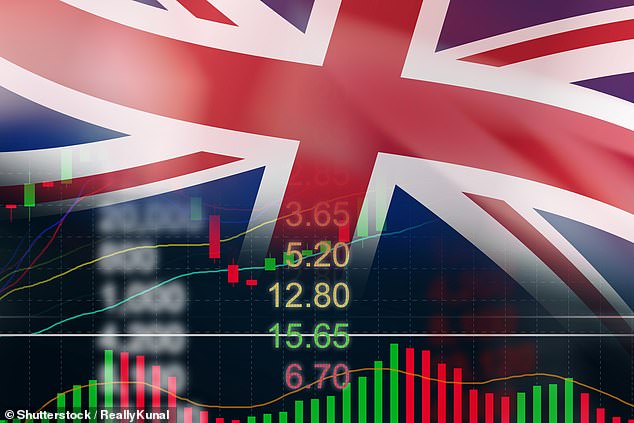[ad_1]
Never has Mark Carney’s 2017 assertion that Britain is dependent on the ‘kindness of strangers’ felt so real.
The former Bank of England governor, now Canadian Prime Minister, made his remarks in the context of Brexit. It is not divorce from the European Union, however, but the failure of successive governments to get to grips with the size of the state which has so empowered the bond markets.
Pledges to reduce levels of UK government debt as a percentage of output have featured in eight of the last ten fiscal plans unveiled by Chancellors of the Exchequer, says the Office for Budget Responsibility (OBR) in its latest fiscal risks report.
Yet despite the declared targets, underlying debt has jumped by 24 per cent of national output over the past 15 years and by 60 per cent over two decades.
The consequence is that the yield on government long-term bonds, gilt-edged stock, is higher now in Britain than at any time since the start of the 21st Century.
A failure to get a grip, symbolised by retreat on welfare reforms, increasingly leaves Britain vulnerable to bond traders. That was seen most clearly during Liz Truss’s brief period as Prime Minister in 2022.

Flashpoint: The yield on government long-term bonds, gilt-edged stock, is higher now in Britain than at any time since the start of the 21st Century
It has also reared its head when Labour took the helm a year ago despite an eye-popping £40billion tax raising budget last October. It notoriously failed to steady the ship.
Bond yields spiked last week when it was feared that Chancellor Rachel Reeves might leave the Government after the retreat from welfare cuts.
Amid the chaos, the hope is that despite tears in the Commons, the Chancellor would stick with her ‘iron clad’ fiscal commitments.
Investment bank Goldman Sachs notes that ‘the UK bond market sell-off largely stems from concerns about fiscal discipline’.
Reneging on the welfare reform cuts is serious enough. But the ‘UK now faces a structural deficit worsened by growth and employment forecasts’.
The Labour narrative is that the problem can be fixed by tax rises in the Autumn with wealth in the line of sight.
The OBR fiscal report suggests that this would only be a palliative unless fundamental changes to pensions and welfare can be delivered. Britain lacks the US anchor of a ‘reserve’ currency and Silicon Valley propelled growth to see off the pressure from the bond vigilantes.
Vulnerability to the type of foreign speculator that Harold Wilson famously described as ‘gnomes of Zurich’ is profound.
The switch in the UK from defined benefit (gold-plated) pension schemes to defined contribution pension plans, more likely to invest in equities than bonds, mean cornerstone buying of gilts will trend down.
The OBR estimates that pension fund holdings of gilts will plunge from 29.5 per cent of gross domestic product in 2024-25 to 10.9 per cent by the 2070s.
Foreigners, the Carney ‘strangers’, presently hold around 30 per cent of the debt stock.
Overseas holders cannot but be aware that the UK has the third highest borrowing costs of any advanced economy but for tiny Iceland and New Zealand.
Ideally, Britain would grow its way out of debt. It has the research universities, tech, science, creativity and financial innovation to do so with the right tax breaks for digital and cyber investment. It cannot do so while the albatross of rocketing pension, welfare and NHS spending hovers.
The ‘triple lock’, costing the Exchequer three times more than projected at £15.5billion, needs to be revised. The unfunded public sector pension fund liability is ballooning along with public sector pay.
An unreformed welfare system will need to be tackled. The number of working-age people classed as inactive since the pandemic has climbed to 780,000, above pre-Covid levels. It is driven by 660,000 citing long-term sickness as a cause of not working.
The OBR estimates the extra welfare cost at £6.8billion a year and forgone tax revenues at £8.9billion.
It is more attractive to go on the sick than claim unemployment benefit which is meaner and requires recipients to look for a job. Such changes dare not speak their name on the Left.
If they don’t happen, it will be mercurial gilt markets, rather than our elected politicians, that will have the biggest say.
DIY INVESTING PLATFORMS

AJ Bell

AJ Bell
Easy investing and ready-made portfolios

Hargreaves Lansdown

Hargreaves Lansdown
Free fund dealing and investment ideas

interactive investor

interactive investor
Flat-fee investing from £4.99 per month

InvestEngine

InvestEngine
Account and trading fee-free ETF investing
Trading 212
Trading 212
Free share dealing and no account fee
Affiliate links: If you take out a product This is Money may earn a commission. These deals are chosen by our editorial team, as we think they are worth highlighting. This does not affect our editorial independence.
[ad_2]
This article was originally published by a www.dailymail.co.uk . Read the Original article here. .

